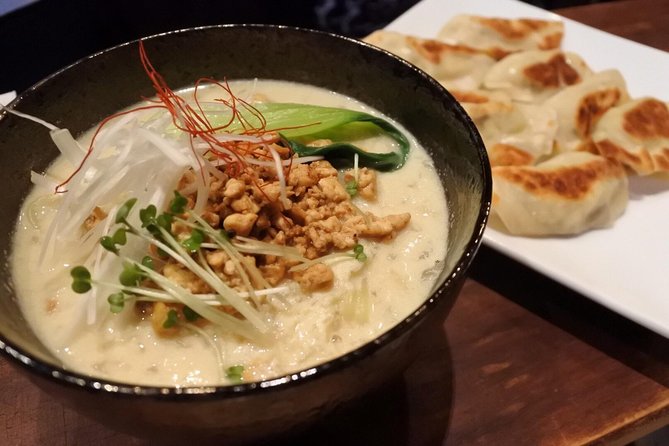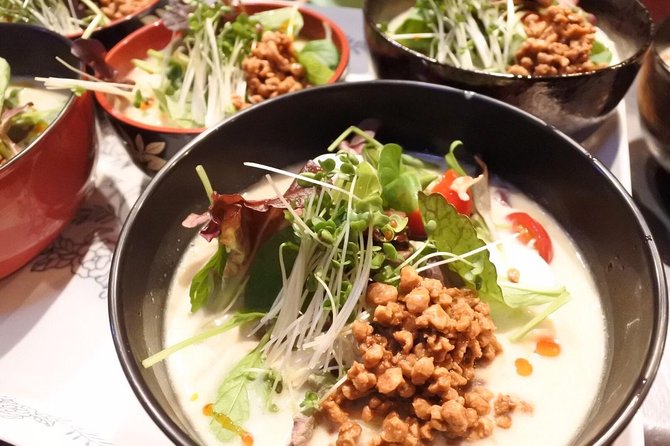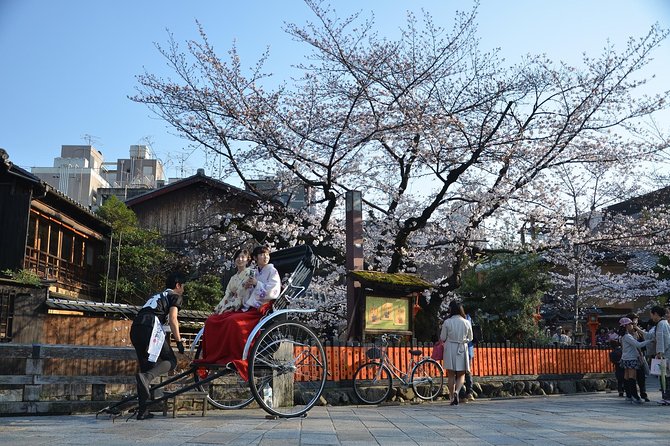Vegetarian Gluten-Free/HALAL Ramen and Gyouza

In a world where dietary preferences can sometimes pose culinary challenges, a fascinating culinary fusion has emerged that caters to a variety of tastes. Imagine a harmonious blend of traditional Japanese flavors with a modern twist that satisfies even the most discerning palates.
The tantalizing aroma of simmering broth, the delicate balance of spices, and the satisfying texture of handmade noodles – all crafted with precision and care. This innovative approach to an iconic dish is sure to intrigue and captivate those seeking a unique dining experience that transcends cultural boundaries and dietary restrictions.
Key Points

- Utilize fresh, high-quality ingredients and Halal options for authentic vegetarian ramen and gyouza.
- Incorporate gluten-free certified soy sauce and seasonings for inclusive dining experiences.
- Infuse rich vegetable broth, fresh vegetables, and flavorful toppings like tofu and seaweed.
- Ensure alignment with Halal principles in ingredient sourcing and preparation methods for cultural sensitivity.
It's also worth checking out some other tours and experiences nearby.
Ramen and Gyouza Overview
Vegetarian Ramen and Gyouza offer a flavorful and satisfying dining experience in Tokyo, Japan. The flavor profiles of these dishes are rich and diverse, showcasing a mix of umami from the broth, freshness from the vegetables, and a hint of spice from the chili oil.
Each bite is a harmonious blend of textures and tastes, creating a unique culinary experience for visitors. In terms of cultural significance, ramen and gyoza hold a special place in Japanese cuisine, symbolizing comfort, warmth, and tradition.
These dishes aren’t just about sustenance but also about bringing people together to enjoy good food and good company. Overall, indulging in Vegetarian Ramen and Gyouza is a must for those looking to explore the authentic flavors of Japan.
Ingredients for Vegetarian Ramen

While preparing the vegetarian ramen, gather a selection of fresh and high-quality ingredients to ensure a delicious and authentic flavor profile.
When exploring ramen variations, consider using Halal options and focusing on Asian noodle dishes.
For a gluten-free cooking experience, opt for rice noodles or ensure the soy sauce and other seasonings are gluten-free certified.
Key components to include in vegetarian ramen are rich vegetable broth, soy sauce, miso paste, garlic, ginger, and a variety of vegetables like bok choy, mushrooms, and green onions.
Toppings such as tofu, seaweed, and boiled eggs can enhance the dish.
Recipe for Vegetarian Ramen

To prepare a flavorful vegetarian ramen, start by simmering a rich vegetable broth infused with soy sauce, miso paste, garlic, ginger, and a medley of fresh vegetables like bok choy, mushrooms, and green onions.
| Ingredients | Instructions |
|---|---|
| Vegetable Broth | Simmer with soy sauce, miso paste, garlic, and ginger. |
| Bok Choy | Add towards the end for a slight crunch. |
| Mushrooms | Saute separately for enhanced flavor. |
| Green Onions | Garnish just before serving for a pop of color. |
For flavor variations, consider adding chili oil for heat or sesame oil for a nutty undertone. Experiment with different cooking techniques like roasting the vegetables before adding them to the broth. In terms of presentation tips, layer the ramen bowl with the vegetables at the bottom and pour the broth on top for an aesthetically pleasing look. Cultural influences can be seen in the use of miso paste, a staple in Japanese cuisine.
Vegetarian Gyouza Ingredients
Infuse your gyouza with a flavorful mix of fresh vegetables and aromatic seasonings to create a delectable vegetarian option.
When preparing vegetarian gyouza, consider the following:
-
Cooking Techniques: Utilize traditional pan-frying methods to achieve a crispy exterior while maintaining a juicy interior.
-
Flavor Profiles: Combine ingredients like shiitake mushrooms, cabbage, and garlic chives for a umami-rich taste that appeals to various palates.
-
Ingredient Sourcing: Ensure the freshness and quality of vegetables by sourcing them from local markets or specialty stores. Embrace the cultural significance of gyouza by incorporating regional produce for an authentic touch.
Recipe for Vegetarian Gyouza
When preparing Vegetarian Gyouza, focus on infusing a mix of fresh vegetables and aromatic seasonings to create a flavorful and satisfying meat-free option. To make the filling, finely chop ingredients like cabbage, carrots, mushrooms, and tofu. Add minced garlic, ginger, soy sauce, and sesame oil for a burst of flavor.
Use store-bought gyoza wrappers or make your own dough with a mix of flour and water. Place a spoonful of the filling in the center of each wrapper, moisten the edges with water, and fold them using traditional gyoza folding techniques for a neat seal.
Pan-fry the gyouza until crispy and golden brown. Pair these delicious dumplings with different Ramen noodle types for a complete and satisfying meal.
Halal Considerations for the Dishes
Considering dietary restrictions, the vegetarian ramen and gyoza dishes offered in this experience adhere to Halal guidelines, ensuring they meet specific dietary requirements for those following Halal practices. When it comes to Halal considerations for the dishes:
-
Halal Certification: Both the ramen and gyoza ingredients are sourced from suppliers with Halal certification, guaranteeing compliance with Islamic dietary laws.
-
Cultural Sensitivity: The preparation process is mindful of cultural sensitivities, ensuring that all aspects of the dishes align with Halal principles.
-
Dietary Restrictions and Flavor Profiles: Despite the restrictions, these dishes are crafted to maintain rich and authentic flavor profiles, catering to diverse tastes while respecting dietary limitations.
Gluten-Free Options and Substitutions
To cater to various dietary needs, the vegetarian ramen and gyoza dishes also offer gluten-free options and substitutions. For individuals with gluten intolerance or dietary restrictions, there are gluten-free alternatives available. These allergy-friendly modifications ensure that those requiring gluten-free options can still enjoy the delicious flavors of the dishes.
On top of that, the hotel also provides Halal options for those adhering to Halal dietary guidelines. By offering these options and substitutions, the cooking class caters to a diverse range of dietary requirements, making it inclusive and accommodating for all participants. Whether due to allergies or personal preferences, participants can rest assured that their dietary needs will be met during the cooking experience.
Cooking Class Details and Booking Information
The Cooking Class Details and Booking Information provide essential information for participants interested in the vegetarian gluten-free/Halal ramen and gyoza experience in Tokyo Prefecture, Japan.
Key Information:
- Cooking Techniques: Participants will learn traditional Japanese cooking techniques to prepare vegetarian gluten-free/Halal ramen and gyoza, understanding their cultural significance.
- Flavor Profiles: Explore the unique flavor profiles of these dishes, including local variations that make them distinct.
- Booking Process: To secure a spot, select a convenient time, with free cancellation available up to 24 hours before the class. Reserve now and pay later to confirm your participation.
Ensure a memorable experience by enjoying the art of creating these delicious dishes while discovering the rich culinary heritage of Japan.
Frequently Asked Questions
Are the Vegetarian Ramen and Gyoza Dishes at Bentoya Cooking Suitable for Individuals With Nut Allergies?
For individuals with nut allergies, the vegetarian ramen and gyoza dishes at BentoYa Cooking offer nut-free alternatives. Allergen information is provided, and dietary restrictions can be accommodated with ingredient substitutions.
Can Participants in the Cooking Class Request Adjustments to the Level of Spiciness in the Homemade Chili Oil Used in the Dishes?
In the cooking class, participants can request spiciness customization for the homemade chili oil to suit their flavor preferences. The class allows for adjustments to cater to different heat levels, ensuring a personalized culinary experience.
Are There Any Recommended Side Dishes or Beverages That Pair Well With the Vegetarian Ramen and Gyoza for a Complete Meal Experience?
When enjoying vegetarian ramen and gyoza, consider pairing them with refreshing cucumber salad or a side of kimchi for contrasting flavors. These combinations enhance the meal experience by adding crunchy textures and spicy notes.
How Long Does It Typically Take to Prepare the Vegetarian Ramen and Gyoza Dishes From Start to Finish in the Cooking Class?
In a typical cooking class, preparing vegetarian ramen and gyoza dishes might take around 2-3 hours. Students learn cooking techniques, timing, and can make ingredient substitutions based on flavor preferences.
Is the Vegetarian Gyoza Sauce Provided in the Class Available for Purchase Separately for Those Who Want to Recreate the Dish at Home?
The vegetarian gyoza sauce provided in the cooking class is available for purchase separately for those looking to recreate the dish at home. It offers an opportunity to replicate the flavors and experience outside the class setting.
Recap
To sum it up, BentoYa Cooking offers a unique culinary experience with their Vegetarian Gluten-Free/HALAL Ramen and Gyouza cooking class in Tokyo.
With a focus on delicious flavors and dietary preferences, participants can enjoy a hands-on cooking session that promises an unforgettable gastronomic journey.
Book your spot now for a taste of authentic Japanese cuisine with a twist.






